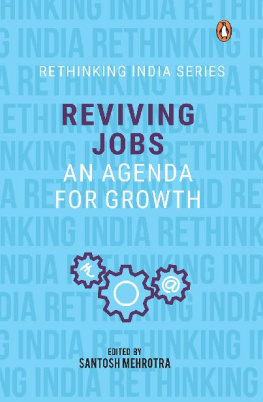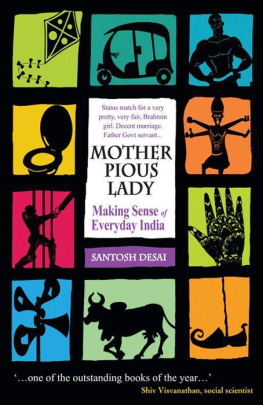SANTOSH MEHROTRA
RETHINKING INDIA SERIES
Reviving Jobs
an Agenda for Growth
Contents
RETHINKING INDIA
Series editors: Aakash Singh Rathore, Mridula Mukherjee, Pushparaj Deshpande and Syeda Hameed
OTHER BOOKS IN THE SERIES
Vision for a Nation: Paths and Perspectives
(Aakash Singh Rathore and Ashis Nandy, eds)
The Minority Conundrum: Living in Majoritarian Times
(Tanweer Fazal, ed.)
Advance Praise for the Book
Too often, policymakers and economists look for a magic bullet to solve the quandary of low employment. Some see it in skills, others in economic growth or business climate and entrepreneurship. Reviving Jobs takes us on a different path: starting with an analysis of the mutually reinforcing feedback loops between economic growth, human capital and poverty reduction that are required, the authors lead us to a comprehensive examination of factors that may ensure a more employment-intensive pattern of growth. In that journey, we travel everywhere: from industrial strategy to artisanal clusters and from the Labour Code to strengthening of towns. Both at the macro and meso level, the essays have an analytical rigour and a clear line of sight towards the main focus of the volume: how to revive jobs in India.Michal Rutkowski, global director, social protection and jobs, World Bank
The single biggest crisis for the Indian economy is how to create the skills and jobs needed to support broad-based inclusive growth. This book provides both a systematic discussion of the key issues and concrete suggestions for policymakers to act on. Highly recommended.Karthik Muralidharan, Tata chancellors professor of economics, University of California, San Diego
The need to create enough jobs, skill up the population, and employ them gainfully is universally recognized as the top agenda item of current Indian economic policy. Failure to draw up and implement such a plan successfully will result in the demographic dividend remaining uncashed. In Reviving Jobs , after a succinct introductory chapter highlighting the major issues, the contours of such a plan follow in a dozen articles. The rich menu covers a variety of issues from government strategy for job creation and labour policies to mass entrepreneurship and boosting womens work participation.Ashok Lahiri, member, 15th Finance Commission, and former chief economic advisor, Government of India
A very timely volume that directly addresses the jobs crisis, Indias central economic challenge today. This valuable collection of papers comprehensively addresses multiple aspects of this challenge, from macroeconomic strategies for reviving inclusive, employment-intensive growth to the policy interventions required for job creation and skilling at the sectoral level to specific approaches for growing jobs in renewable energy, in the urban sector, and for specially vulnerable social groups: women, Scheduled Castes and Scheduled Tribes. An important read for economists, policymakers and all socially concerned citizens.Sudipto Mundle, former principal India economist, Asian Development Bank
Series Editors Note
P sychologists tell us that the only true enemies we have are the faces looking back at us in the mirror. Today, we in India need to take a long, hard look at ourselves in the mirror. With either actual or looming crises in every branch of government, at every level, be it centre, state or local; with nearly every institution failing; with unemployment at historically high rates; with an ecosystem ready to implode; with a healthcare system in shambles; with an education system on the brink of collapse; with gender, caste and class inequities unabating; with civil society increasingly characterized by exclusion, intolerance and violence; with our own minorities living in fear; our hundreds of millions of fellow citizens in penury; and with few prospects for the innumerable youth of this nation in the face of all these increasingly intractable problems, the reflection is not sightly. Our true enemies are not external to us, not Pakistani terrorists or Bangladeshi migrants, but our own selves: our own lack of imagination, communication, cooperation and dedication towards achieving the India of our destiny and dreams.
Our Constitution, as the preamble so eloquently attests, was founded upon the fundamental values of the dignity of the individual and the unity of the nation, envisioned in relation to a radically egalitarian justice. These bedrock ideas, though perhaps especially pioneered by the likes of Jawaharlal Nehru, B.R. Ambedkar, M.K. Gandhi, Maulana Azad, Sardar Patel, Sarojini Naidu, Jagjivan Ram, R. Amrit Kaur, Rammanohar Lohia and others, had emerged as a broad consensus among the many founders of this nation, cutting across divergent social and political ideologies. Giving shape to that vision, the architects of modern India strived to ensure that each one of us is accorded equal opportunities to live with dignity and security, has equitable access to a better life, and is an equal partner in this nations growth.
Yet, today we find these most basic constitutional principles under attack. Nearly all the public institutions that were originally created in order to fight against dominance and subservience are in the process of subversion, creating new hierarchies instead of dismantling them, generating inequities instead of ameliorating them. Government policy merely pays lip service to egalitarian considerations, while the actual administration of justice and implementation of laws are in fact perpetuating precisely the opposite: illegality, criminality, corruption, bias, nepotism and injustice of every conceivable stripe. And the rapid rise of social intolerance and manifold exclusions (along the lines of gender, caste, religion, etc.) effectively whittle down and even sabotage an inclusive conception of citizenship, polity and nation.
In spite of these and all the other unmentioned but equally serious challenges posed at this moment, there are in fact new sites for sociopolitical assertion re-emerging. There are new calls arising for the reinstatement of the letter and spirit of our Constitution, not just normatively (where we battle things out ideologically) but also practically (the battle at the level of policy articulation and implementation). These calls are not simply partisan, nor are they exclusionary or zero-sum. They witness the wide participation of youth, women, the historically disadvantaged in the process of finding a new voice, minorities, members of majority communities, and progressive individuals all joining hands in solidarity.
We at the Samruddha Bharat Foundation proudly count ourselves among them. The Foundations very raison dtre has been to take serious cognizance of Indias present and future challenges, and to rise to them. Over the past two years, we have constituted numerous working groups to critically rethink social, economic and political paradigms to encourage a transformative spirit in Indias polity. Over 400 of Indias foremost academics, activists, professionals and policymakers across party lines have constructively engaged in this process. We have organized and assembled inputs from jan sunwai s (public hearings) and jan manch s (public platforms) that we conducted across several states, and discussed and debated these ideas with leaders of fourteen progressive political parties, in an effort to set benchmarks for a future common minimum programme. The overarching idea has been to try to breathe new life and spirit into the cold and self-serving logic of political and administrative processes, linking them to and informing them by grass-roots realities, fact-based research and social experience, and actionable social-scientific knowledge. And to do all of this with harmony and heart, with sincere emotion and national feeling.















